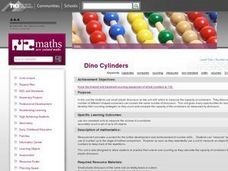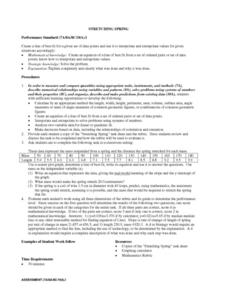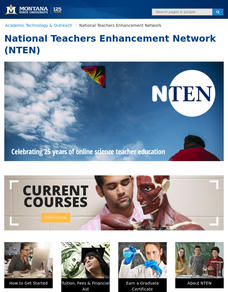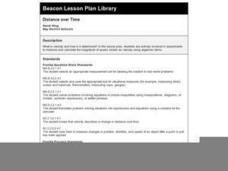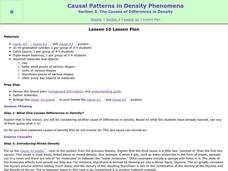Curated OER
Dino Cylinders
Students investigate the capacity of containers using small dinosaur figures as the unit of measure. They work with a number of different shaped containers to compare the capacity as they practice counting the dinosaurs. They complete an...
Curated OER
Create your own thermometer
Students participate in an activity where they build a calibrated thermometer. In this thermometer lesson students complete this activity and take notes.
Curated OER
Science: Liquid Matter
Second graders examine the properties of liquids and their classifications. They compare and contrast cups of different liquids and record their findings in journals. Students observe how liquids flow at various speeds and that unlike...
Curated OER
Measuring Angles
Third graders describe an amount of turn from a particular position to another using the 'circular' benchmarks of 0, ++, ++, ++, and full turn. Estimation language such as 'just about', 'between', 'not quite', 'just over', and similar...
Curated OER
Pumpkin Properties are a Smash!
Students receive a miniature pumpkin and proceed through several stations to measure a variety of physical properties. The data is entered into a data sheet and the mass and volume measurements are used to calculate density. They also...
Curated OER
Lesson 5: Boyle's Law
Students participate in a lab to verify Boyle's Law using applied force (weight) to do work on a closed isolated system of air. "Elasticity of Gases Apparatus, BASIX" from Sargent-Welch is the syringe apparatus used to measure volume...
Curated OER
Testing Density of Various Soap Products
Students have the opportunity to observe, measure and analyze the density of aerosol shaving creams and foams generated from shampoo and dishwashing liquids or detergents.
Curated OER
Surface Area with Polydrons
Students explore measurements by analyzing geometric shapes. In this surface area instructional activity, students identify the terms volume, weight, perimeter and area in order to find the requested measurements of specific polygons....
Curated OER
STRETCHING SPRING
Learners calculate the length, width, height, perimeter, area, volume, surface area, angle measures or sums of angle measures of common geometric figures. They create an equation of a line of best fit from a set of ordered pairs or...
Curated OER
Pounds and Ounces: It's All About Weight
First graders explore number sense by participating in a measurement estimation activity. In this weight lesson, 1st graders discuss the differences between measurement units, both English and Metric. Students examine a loaf of bread to...
Curated OER
Shadows
Students measure shadows at different times of the day to determine when a shadow casts its longest and shortest shadows.
Curated OER
Pendulum Activity
Fourth graders conduct a lab activity that measures the factors that change the swing rate of a pendulum. They create a hypothesis and test it during the experiment. They record their observations using the recording sheets and journal...
Curated OER
Demonstrating Erosion in Action
Students easure and record volume of water, then measure and record mass of soil. They explain the effects of the following in controlling erosion: Contouring, cover crop, strip cropping, reforestation, inter-seeding.
Curated OER
Dream Bedroom Floor Plan
Students construct using Cabri software. In this geometry instructional activity, students convert between units and apply the correct measurements to build objects. They create the room virtually and manipulate the shapes to the desired...
Curated OER
PLANETS IN PROPORTION
Students discover scales for both the solar bodies' relative sizes and their distances from the sun. They find equatorial circumference and volumes of their solar bodies. Students apply estimation strategies and proportioanl reasoning to...
Curated OER
Distance over Time
Students analyze velocity and how it is determined. They experiment with velocity in order to measure and calculate the magnitude of speed. They use examples in their novel "Skateboard Renegade" to relate velocity to real life situations.
Curated OER
Causal Patterns in Density Phenomena
Students investigate the relationship between volume and mass in different liquids such as vegetable oil, rubbing alcohol and water. They measure the mass of several different volumes of each liquid and then graph the results as well as...
Curated OER
The Causes of Differences in Density
Students explore the causes of differences in density. Students choose objects, measure the mass and volume, and calculate the density of each. They perform additional density experiments to model atoms and their correspondence to...
Curated OER
Comparing the Density of Iron
Young scholars use scientific measuring tools to collect and use scientific data. They determine the density of four different objects by using their data to explain why objects have similar/different densities even though they are both...
Curated OER
Customary Measurement Conversions
Fifth graders discover in hands-on activities the relationships between the measures. They work in groups to create conversion tables using familiar measuring tools. Students solve problems requiring conversions.
Curated OER
Bone Density
Students recognize how the strength and density of bone can reduce fractures. In this bone density lesson, students calculate density as they measure volume and mass of serial bone specimens in a group activity.
Curated OER
Pirate Plays
Students performing a scene about pirates and spend time making a measuring meters incorporating the main character, Captain Blood to add interest. They use meter sticks measuring items from the play and record their answers in meters.
Curated OER
Puzzling Perimeters
Third graders use estimation, fractions and decimals to determine the perimeter of objects in the classroom. They are given a worksheet with a list of the items on it. The worksheet has columns beside each of the items for estimation and...
Curated OER
Exercise Those Statistics!
Students participate in various activities, measuring their pulse rates and recording the data. They analyze the statistical concepts of mean, median, mode, and histograms using the data from the cardiovascular activities.
